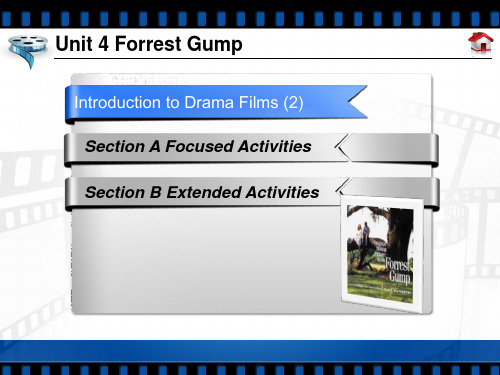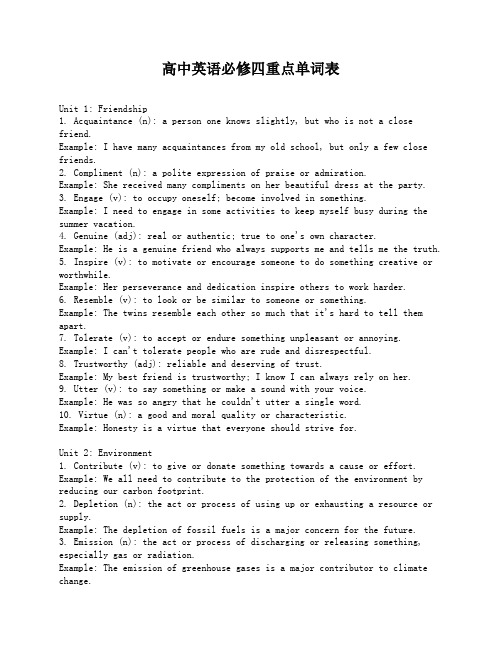4 drama
研究生学术英语答案Unit 4

Section A
பைடு நூலகம்Part 1 Lead-in
Best Film Editing Best Picture Best Writing, Screenplay Based on Material from Another Medium Nominated • Oscar: Best Actor in a Supporting Role Best Cinematography
Introduction to Cartoon Films (2)
Unit 4 Forrest Gump
Section A Focused Activities Part 1 Lead-in
Part 2 Watching & Listening
Part 3 Fun Time
Section A
Part 1 Lead-in
1. Which are the first lines of the film? A) Hello. I’m Forrest, Forrest Gump let me tell you my story. B) Hello. I’m Forrest Gump and this is Jenny, my Jenny. C) Hello. My name’s Forrest, Forrest Gump. You want a √ chocolate. D) Hello. Forrest Gump is my name and glad to meet you.
Section A
Part 2 Watching & Listening
√
√
4. How does Forrest get his name? A) He’s named after a Civil War hero. B) He’s named after his grandfather. C) He’s named after one of his relatives. D) He’s named after a famous general. 5. When Forrest’s mama says, “Life was like a box of chocolates. You never know what you’re gonna get”, she means that A) “Life is compared to a voyage.” B) “Life is but a hard and tortuous journey.” C) “Life is full of wonders for us to explore.” D) “Life is short for everyone.”
四年级英语北京版试卷

四年级英语北京版试卷考试范围:xxx;考试时间:xxx分钟;出题人:xxx姓名:___________班级:___________考号:___________1.答题前填写好自己的姓名、班级、考号等信息2.请将答案正确填写在答题卡上一、选择题1.It’s ___Queen’s house.A.a B.an C.the2.根据图片选择正确的短语。
3.找出每组中与其他两个不同类的一项( )(1)A、fourteen B、thirteen C、sixteen D、sure( )(2)A、football B、swim C、skate D、jump( )(3)A、mango B、horse C、tiger D、panda( )(4)A、cat B、pear C、pineapple D、mango( )(5)A、basketball B、table tennis C、football D、grape4.别人给你吃东西,如果你不想吃,你应该说:A. Yes, thank you.B. No, that’s OKC. No, thanks.5.That is_________grandfather.A.Tom and PeterB.Tom’s and Peter’sC.Tom and Peter’s6.I like those _________.A.pantB.pantsC.hat7.Where is my grandfather?A.He is my grandfather.B.She is a vet.C.He is in front of the old man.8.听录音,根据你所听到的问题,选择最合适的答句,并将其前面的字母编号填在题前的括号内,每个问题将读两遍。
(10分)(1) A.Miss Green is. B.Yes, she is . C.She’s a teacher.(2) A.Yes ,it is . B.Two pencils. C.It’s a bag.(3)A.It’s my ruler. B.I have 2. C.It’s blue.(4) A.Yes, I do. B.I’d like some beef . C.Yes ,I can.(5)A.It’s near the door. B.Yes, it is . C.I can 12.9.Give me ________ pens.A. twoB. anC. a10.—What are you doing?—I _____ housework with my mum.A. doB. doingC. am doing二、判断题11.听录音,判断下列说法是否正确,对的打“√”,错的打“×”。
高中英语必修四重点单词表

高中英语必修四重点单词表Unit 1: Friendship1. Acquaintance (n): a person one knows slightly, but who is not a close friend.Example: I have many acquaintances from my old school, but only a few close friends.2. Compliment (n): a polite expression of praise or admiration.Example: She received many compliments on her beautiful dress at the party. 3. Engage (v): to occupy oneself; become involved in something.Example: I need to engage in some activities to keep myself busy during the summer vacation.4. Genuine (adj): real or authentic; true to one's own character.Example: He is a genuine friend who always supports me and tells me the truth.5. Inspire (v): to motivate or encourage someone to do something creative or worthwhile.Example: Her perseverance and dedication inspire others to work harder.6. Resemble (v): to look or be similar to someone or something.Example: The twins resemble each other so much that it's hard to tell them apart.7. Tolerate (v): to accept or endure something unpleasant or annoying. Example: I can't tolerate people who are rude and disrespectful.8. Trustworthy (adj): reliable and deserving of trust.Example: My best friend is trustworthy; I know I can always rely on her.9. Utter (v): to say something or make a sound with your voice.Example: He was so angry that he couldn't utter a single word.10. Virtue (n): a good and moral quality or characteristic.Example: Honesty is a virtue that everyone should strive for.Unit 2: Environment1. Contribute (v): to give or donate something towards a cause or effort. Example: We all need to contribute to the protection of the environment by reducing our carbon footprint.2. Depletion (n): the act or process of using up or exhausting a resource or supply.Example: The depletion of fossil fuels is a major concern for the future.3. Emission (n): the act or process of discharging or releasing something, especially gas or radiation.Example: The emission of greenhouse gases is a major contributor to climate change.4. Extinction (n): the act or process of dying out or becoming extinct. Example: Many species are at risk of extinction due to deforestation.5. Inevitable (adj): certain to happen; unavoidable.Example: The consequences of our actions are inevitable; we need to take responsibility for them.6. Preserve (v): to keep or maintain something in its original or existing state.Example: We need to preserve our natural resources for future generations.7. Promote (v): to support or encourage the growth or development of something. Example: The government should promote renewable energy sources to reduce carbon emissions.8. Recycle (v): to convert waste into reusable material.Example: We should recycle paper, plastic, and glass to reduce waste.9. Sustainable (adj): able to be maintained or continued over the long term. Example: Switching to renewable energy sources is crucial for creating a sustainable future.10. Wildlife (n): animals and plants that live in their natural environment, not domesticated or cultivated.Example: The destruction of wildlife habitats is a major threat to biodiversity.Unit 3: A Healthy Life1. Adequate (adj): enough or satisfactory in quantity or quality.Example: It's important to get adequate sleep for good health.2. Alleviate (v): to make something less severe or more bearable.Example: Drinking herbal tea can help alleviate a sore throat.3. Cope (v): to deal effectively with something difficult or challenging. Example: It can be difficult to cope with stress, but meditation and exercise can help.4. Diagnose (v): to identify or determine the nature of a disease or medical condition.Example: The doctor will need to run some tests to diagnose your illness.5. Epidemic (n): a widespread occurrence of a disease in a community or population at a particular time.Example: The flu epidemic resulted in many people falling ill.6. Infectious (adj): capable of being transmitted from one person to another. Example: Cold and flu viruses are highly infectious and can spread rapidly.7. Nutrition (n): the process of providing or obtaining the food necessary for health and growth.Example: A balanced diet is essential for good nutrition.8. Obesity (n): a medical condition characterized by an excess of body fat.Example: Childhood obesity has become a major concern in many countries.9. Recovery (n): the process of regaining health or strength after an illness or injury.Example: With proper treatment, her recovery from surgery was swift.10. Therapy (n): treatment intended to relieve or heal a disorder or illness. Example: Physical therapy can help with the recovery of muscle injuries.Unit 4: Literature and Art1. Appreciate (v): to recognize the value or importance of something; toadmire or enjoy something.Example: I appreciate classical literature for its timeless themes andbeautiful language.2. Capture (v): to catch or seize something, often in a photograph or painting. Example: The artist's painting captured the beauty of the sunset perfectly.3. Display (v): to show or exhibit something for others to see.Example: The museum displays a wide range of historical artifacts.4. Drama (n): a genre of literature or performance characterized by conflict and emotion.Example: Shakespeare's plays are known for their drama and tragic themes.5. Imagery (n): the use of vivid or descriptive language to create mental images.Example: The poet's use of imagery painted a picture in my mind.6. Sculpture (n): a three-dimensional work of art created by carving, modeling, or molding materials.Example: The sculpture in the park was made from bronze and symbolized peace.7. Symbol (n): an object, person, or idea that represents or stands for something else.Example: The dove is a symbol of peace and freedom.8. Theme (n): the main idea or underlying message in a literary or artistic work.Example: The theme of love and sacrifice is prevalent in many classic novels.9. Verse (n): a line of poetry or a metrical composition.Example: He recited a beautiful verse from his favorite poem.10. Visual (adj): relating to or involving seeing or sight.Example: The graphic designer created a visually stunning website.Unit 5: Cultural Identity1. Adapt (v): to adjust or modify oneself to fit new circumstances or conditions.Example: When moving to a new country, it's important to adapt to the local customs and traditions.2. Ancestor (n): a person who is related to you and lived in the past. Example: My ancestors emigrated from Ireland during the potato famine.3. Assimilate (v): to absorb or integrate into a larger community or culture. Example: Immigrants often need to assimilate into their new society while maintaining their cultural identity.4. Custom (n): a traditional way of behaving or doing something that isspecific to a particular society or group.Example: It's a custom in our family to exchange gifts on Christmas Eve.5. Heritage (n): the legacy or inheritance of cultural traditions and customs. Example: I am proud of my Chinese heritage and celebrate traditional festivals with my family.6. Origin (n): the point or place from which something begins or arises. Example: The origin of the custom of exchanging wedding rings dates back to ancient Egypt.7. Ritual (n): a religious or solemn ceremony consisting of a series ofactions performed in a set order.Example: The bride and groom conducted traditional marriage rituals to symbolize their union.8. Symbolize (v): to represent or stand for something through the use of symbols.Example: The color red in Chinese culture symbolizes luck and happiness.9. Tradition (n): a belief, custom, or practice that is handed down from generation to generation.Example: It's a tradition in our family to have a big reunion dinner during Chinese New Year.10. Values (n): principles or beliefs that are considered important or desirable in a culture.Example: Honesty and respect for others are important values in many societies.Unit 6: Health and Wellness1. Balance (v): to manage successfully the different aspects of one's life, such as work, family, and personal interests.Example: Maintaining a healthy work-life balance is essential for overallwell-being.2. Diet (n): the food that a person or organism habitually eats.Example: A balanced diet includes a variety of fruits, vegetables, whole grains, and lean proteins.3. Exercise (v): to engage in physical activity to maintain fitness, health,or pleasure.Example: Regular exercise can improve cardiovascular health and boost mood.4. Habit (n): an established way of behaving; a regular pattern of behavior.Example: Developing healthy habits, such as drinking plenty of water andgetting enough sleep, can lead to a better quality of life.5. Lifestyle (n): the way a person lives, including their habits, activities, and choices.Example: An unhealthy lifestyle can increase the risk of developing chronic diseases.6. Meditation (n): a practice in which a person focuses their attention to achieve a state of relaxation, clarity, and concentration.Example: Meditation can help reduce stress and improve mental well-being.7. Mental (adj): relating to the mind or mental processes.Example: Mental health is crucial for overall health and wellness.8. Nutrition (n): the nourishment required by the body to maintain health, energy, and growth.Example: Good nutrition is important for the proper development andfunctioning of the body.9. Relax (v): to become calm and peaceful; to reduce tension and stress. Example: Engaging in activities like yoga or reading can help relax the mind and body.10. Well-being (n): the state of being healthy, happy, and prosperous. Example: Pursuing activities that promote well-being, such as spending time with loved ones or pursuing hobbies, can enhance one's overall quality of life. Unit 7: Science and Technology1. Invention (n): the creation of a new device or method by inventive talent. Example: The invention of the internet has revolutionized the way we communicate and access information.2. Innovation (n): the act or process of introducing new ideas, devices, or methods.Example: Technological innovation has led to advancements in medicaltreatments and procedures.3. Experiment (n): a procedure or activity carried out to support, refute, or validate a hypothesis.Example: Scientists conduct experiments to test their theories and gain abetter understanding of the natural world.4. Theory (n): a proposed explanation for a phenomenon, especially one that is supported by scientific evidence.Example: The theory of evolution explains how species change over time through the process of natural selection.5. Discovery (n): the act of finding something unknown or the thing found. Example: The discovery of penicillin by Alexander Fleming revolutionized the field of medicine.6. Evidence (n): information that makes it likely that a theory or claim is true.Example: Fossil records provide evidence of the existence of extinct species.7. Research (n): the systematic investigation of a subject or the methodical study of materials and sources to establish facts and reach new conclusions. Example: Medical researchers study diseases to find better treatments and cures.8. Scientist (n): a person who is qualified or engaged in a scientific field of study.Example: A chemist is a scientist who studies the properties and composition of substances.9. Technology (n): the application of scientific knowledge for practical purposes, especially in industry and engineering.Example: Modern technology has allowed for advancements in communication and transportation.10. Theory (n): a set of principles or ideas intended to explain how something works or why something happens.Example: The Big Bang theory explains the origin and evolution of the universe.。
没有钱drama翻译4

没有钱drama翻译4お金がないっ4お金じゃ买えないっT(没钱系列4-钱买不到) 原作:篠崎一夜イラスト:香坂透〖CAST〗绫瀬雪弥……石田彰狩纳北……小杉十郎太染矢薫子……飞田展男染矢の父……饭冢昭三运転手……浅野宪弘男1……小原雅一男2……保村真林田直俊……绪方贤一久芳誉……辻谷耕史许斐清贵……铃置洋孝TRACK01“你听好,不只是金额的问题,同时你也别想跑出我的手掌心。
” “狩纳桑……”“清楚了,我会再和你联络。
”“你醒了吗,”“嗯,对不起。
狩纳桑,在打电话工作吧,”“没什么大不了的事。
”啾~“那么,你没事吧,”(好像是)“啊~等等……狩纳桑,啊……”后面全没懂,好像是说要凌濑快点准备打算带他出去见几个人。
场景转换,来到了一间酒吧。
“鹰嘴父亲不在吧,”“那家伙,公司又把他叫回去,他刚刚才走。
”“什么嘛,是他把我叫来的~”“没关系~您请坐。
就算你父亲走了,也还有法律顾问替代,这也够了~坐下来谈吧。
”狩纳桑的父亲,“北君,这个孩子是……”“啊,介绍一下。
这位是凌濑雪弥,现在住在我那里。
” “啊,初次见面,请多关照。
”“这位是染矢先生。
”“染矢,”“对,这是染矢的父亲。
”“诶,”后面是谈论染矢,染矢爸爸好像说自己是个不合格的父亲之类。
然后又说自己和狩纳的爸爸是旧识。
接下来是谈论生意。
然后凌濑就借口要去方便,起身出去了,之后是凌濑自言自语,好象说了狩纳把自己这么冒失的介绍给别人没关系的吧什么的,我又没太听懂(汗……)“噢……”“哈哈哈哈~”(猥亵的笑声)“请问怎么了,”“你看,果然是个男的。
”“啊,很可爱啊。
你在这干什么,”动手动脚“请不要这样~”“不如陪我们玩玩吧。
哈哈哈……”(BT~) “等等,放手~”凌濑好像被别人抱住了。
“干什么呀,狩纳桑。
”“没事吧,”(日本人的中文真不敢恭维~) 咦,不对,不是狩纳桑。
是谁啊, “没四~谢谢~”(石头好广东的中文,汗……) “不客气。
很高兴你会说中国话~我忘了这里是日本。
剑4词汇总结

Frequent 频繁的evolve 进化function 功能vision 视觉track 追踪Illustration 阐明object 物体restrict 限制evidence 证据exceptional 杰出的representation (symbol)代表,象征dramatical 剧烈的Estimate 预计investigation 调查taken aback 惊讶subject 实验对象Independent 独立的rapid 快速的consensus 一致 general 普遍的abstract 抽象recognize识别outline 轮廓motion 移动linguistics 语言学extinction 灭绝loss 损失reject 拒绝induce 导入intimetly 亲密地pattern 形式diversity 多样性strucuture 构建bilingual 双语的preserve 保护essential 基本的establish 建立alternative 另一种orthdox 正统steadily 稳步地consultaion 咨询disillusioned 幻想破灭的erode 腐烂Misconception 误解resist 抵制incentive 动机eliminate 去除apporach 方法Isolated 孤立的poentential 潜在的chronic 长期的mainstream 主流Erroneous 错误的complementary 互补的conventional 常规的complex 复杂的Questionnaire 调查问卷relectant 勉强的permenant 长久的hypothesis 假设Geograohical 地理的environment 环境activate 激发stimulation 刺激be associated with 涉及connection 联系tendency 倾向性specific 具体的Dominant 主导的substance 物质modify 改变ecology 生态学Habitat 栖息地creativity 创造性signal 信号poverty 贫困circumstance 环境Indigenous 聪明的predictable 可预测的volcano 火山eruption 爆发Identify 识别continent 大陆atmosphere 氛围shape 塑造fracture 断裂Responsible for 导致crust 地壳mantle 地幔,plate 板块explode 爆炸Contribute to 导致 swift 快速的violent 暴力的tremendous 大量的Appreciate 鉴别expand 扩充procedure 步骤ambiguity 模糊factor 因素Involve 涉及influence 影响quality 质量anticipate 预言generate 生成Ignore 忽视require 需求genetics 基因possess 拥有nutrition 营养Mammal 哺乳动物adequate 充足的supplement 补充deficiency 缺乏Simulation 模仿contradiction 矛盾comprehend 理解fundamental 基本的Maintain 维护duplicate 复制method 方法institute 机构archeology 考古Imagination 想象discipline 学科anthropology 人类学characteristics 特征Break down into 分类significant 重大的document 记入档案deduce 归纳Illusion 幻想role 作用sustainable 持久的resource 资源proportion 比例Awareness 意识realization 实现contrary 相对的inevitable 不可避免的Obligation 义务distinction 区别liberty 自由consistent 一致的Evident 明显的impact 作用。
drama 单词

drama 单词
Drama这个单词可以指戏剧、剧情、麻烦事等多个意思。
下面我们就按照不同意思的用法来分步骤阐述。
1. 戏剧意义:drama最常见的用法就是指戏剧。
在这个意义下,drama通常可以指一个剧作,也可以指表演这个剧作的过程。
比如说,我们可以说这部电影是一部非常好的drama,也可以说这部电影的drama很出色。
2. 剧情意义:除了指戏剧,drama还可以指剧情。
在这个意义下,drama通常会出现在影视评论或者剧情介绍中。
比如说,我们可以说这部电影的drama非常扣人心弦,或者说这个电视剧的drama发展得很顺畅。
3. 麻烦事意义:除了上述两个含义外,drama还可以指麻烦事。
在这个意义下,drama通常会用在口语中,表示某个事情比较复杂或者麻烦。
比如说,我们可以说处理这个问题太drama了,或者说这个计划有点drama。
总之,drama这个单词非常常用,可以表示戏剧、剧情、麻烦事等多个意思。
在不同的场合,我们可以灵活运用这个词来表达自己的意思。
九年级英语:Unit 4 Drama

初中英语新课程标准教材英语教案( 2019 — 2020学年度第二学期 )学校:年级:任课教师:英语教案 / 初中英语 / 九年级英语教案编订:XX文讯教育机构Unit 4 Drama教材简介:本教材主要用途为通过学习英语的内容,提高学生的语言技能,增加一项语言能力,有利于国际化的日常交流、生活、工作等,本教学设计资料适用于初中九年级英语科目, 学习后学生能得到全面的发展和提高。
本内容是按照教材的内容进行的编写,可以放心修改调整或直接进行教学使用。
unit 4 drama一、单元分析(unit analysis)(一)单元地位(unit position)1.本课在对戏剧描述时,谈及了戏剧的特点以及如何欣赏英语戏剧。
教师可围绕“戏剧”这一主题,让学生知道:what is drama?同时设计活动让学生参与戏剧的改变或者表演,加强对戏剧的基本要素的了解以戏剧演员的自身要求。
了解了戏剧的方方面面,学生才能学会如何欣赏和评论戏剧这一单元会弥补学生对戏剧知识的空白,激发学生热爱戏剧,自编戏剧,同时也提高了学生的文化素养。
2.围绕本课主题“戏剧”,学生探讨一部戏剧的定义和戏剧的基本要素:plot, character,setting, theme, language, setting, spectacle, music…。
并在此基础上,学会欣赏,表演或改编戏剧。
3.本课中依然是复习上单元的语法现象——虚拟语气。
本单元主要学习以下的虚拟: iwish i could…; if only…对于这一语法现象,教师有必要在课堂教学中加以一定的句型操练。
同时结合上一课的虚拟复习整个虚拟语气现象。
4.设计对话,小品等形式,让学生在任务型教学模拟情境中反复操练本单元出现的虚拟语气从句语法现象。
(二)单元目标(unit target)1了解虚拟语气语法现象,能掌握虚拟语气的用法。
2学会如何欣赏英语短剧。
3学会把英语短故事改编成短剧。
太drama了什么意思

太drama了什么意思太 drama 了,什么意思?有很多人认为,太 drama 了,就是指那些本来一个很普通的事情却被描述得过于夸张或者做作。
而且说话比较搞笑幽默、不按常理出牌,令别人捉摸不透,自己又没有意识到,导致闹出笑话,所以也会用到这句话表达一种不好意思的感觉,形容尴尬时候的状态,这是最近两年才兴起的流行词汇,用来表示对某件事物不可思议或者无法想象的程度之高,说白了,就是形容:“太厉害了”,“太牛了!”“太奇葩了!”等含义。
太 drama 了太 drama 了是什么意思?这个词大家应该都知道吧,这是最近两年才开始在网上火起来的,在网络里面使用频率非常高,它的意思和字面意思差不多,就是形容你发生的事情特别的离谱,但同时又带着点喜剧色彩。
其实,很多人认为,太 drama 了,并不是真正的夸张,因为很多人看到一些超乎寻常的东西后,总是忍不住想要去吐槽一番,当然,他们更加注重的还是一种娱乐精神,把它称为“太 drama 了”。
太drama 了太 drama 了是什么意思?太 drama 了是一种很流行的网络语言,通常我们会把太戏剧化的现象叫做 drama (戏剧化),而把太drama 的现象叫做 dramatized (戏剧性)。
这两个概念混淆了,drama 的意思是“戏剧化”,如果把它引申成夸张、夸大的意思,那就变成了“太戏剧化”,这样的说法听起来怪怪的。
这是网络语言,它原先只是在日本动漫中流传,但是随着这几年网络的飞速发展,网友们开始运用这些词汇来表达各种搞笑的场景。
这些词的最初由来已经不可考证,但在《新华字典》中是找不到的,在一些小说中也未曾提及,它是网民们创造出来的。
有网友称,这些词的走红与游戏解说、弹幕视频、直播平台的崛起密切相关,因为网友们习惯了快节奏的网络文化,喜欢在短时间内获取信息,太 drama 的词汇让他们能够轻松地记忆。
- 1、下载文档前请自行甄别文档内容的完整性,平台不提供额外的编辑、内容补充、找答案等附加服务。
- 2、"仅部分预览"的文档,不可在线预览部分如存在完整性等问题,可反馈申请退款(可完整预览的文档不适用该条件!)。
- 3、如文档侵犯您的权益,请联系客服反馈,我们会尽快为您处理(人工客服工作时间:9:00-18:30)。
“上帝啊!上帝啊!人世间的一切在我看来是多么可 厌、陈腐、乏味而无聊!哼!哼!那是一个荒芜不 冶的花园,长满了恶毒的莠草……这样好的一个国 王,比起当前这个来,简直是天神和丑怪……只有 一个月的时间,我不能再想下去了!脆弱啊,你的 名字就是女人(“Frailty, thy name is women” )! 短短的一个月以前,她哭得像个泪人儿似的,送我 那可怜的父亲下葬;她在送葬的时候所穿的那双鞋 子还没有破旧,她就,她就——上帝啊!一头没有 理性的畜生也要悲伤得长久一些——她就嫁给我的 叔父……只有一个月的时间,她那流着虚伪之泪的 眼睛还没有消去红肿,她就嫁了人了。啊,罪恶的 匆促,这样迫不及待地钻进了乱伦的衾被……”
Characters: Portia: Shakespeare’s ideal woman, beautiful, cultured, courteous and capable; Shylock: Jewish money-lender, avaricious, merciless, mean and cruel; BUT he suffered a lot in the hands of the Christians: injustice and discrimination.
作品生动再现了那个“颠倒混乱的世代”复杂的社会现实; 展示了封建王朝内部复杂的权力之争。 《哈姆雷特》始终的悲剧意象构起一种混乱无序、病态感和 败坏感(moral corruption and political chaos),篡权杀君 , 母亲的改嫁,王位的丢失,一下把一个对未来充满美好梦想 的年轻王子置于一个不堪的现实,他的个人的悲剧上升到了 人间的堕落,尘世的腐败。 “Something is rotten in the state of Denmark The time is out of joint.
1. A Midsummer Night’s Dream 《仲夏夜之梦》
《仲夏夜之梦》是一部富于幻想、轻松浪漫的童话喜剧。取 材自希腊神话,故事发生在雅典。剧中有四条线索,情节扑 朔迷离。森林里的精灵疏忽大意导致一些列的误会,森林一 片混乱,不过最后误会消除,有情人终成眷属。 《仲夏夜之梦》是莎翁喜剧进入成熟期的标志。汇集了他早 期创作的种种尝试,构思别出心裁,充分展示了他丰富的诗 性想象力。该剧就情节和舞台设计而论,没有其他任何一部 莎士比亚的剧本能超越它。
哈姆雷特得知父亲被叔父害死,在复仇问题上,又开始 犹豫不决,又很多顾虑。“How am I to do it? When? Where? What will be the consequence to the state? What is the good of doing it in such a world as this?” 生与死的问 题一直困扰着哈姆雷特,连带着每件事的价值评判,到底做 还是不做,去还是不去,牺牲还是不牺牲?理性的思维能够 指导行动,但是过多的思虑就会延误时机,多虑的人内心往 往是懦弱的,对后果太多的顾虑导致其不愿作出重大决定。 3. Oedipus complex: “俄狄浦斯情结” 或“恋母情结”。 心理学分析专家弗洛伊德提出了种“俄狄浦斯情结”,即世 上的男孩内心都有杀父娶母,女孩都有杀母嫁父的情结。
Hamlet: Denmark is a prison. Rosencrantz: Then is the world one. Hamlet: A goodly one; in which there are many confines, wards, and dungeons. Denmark being one of the worst.”
Claudius:复杂的个性,一方面恶势力的代表,阴 险狡诈,心狠手辣,荒淫的篡权者。另一方面,新 兴资产阶级的代表。
7. Othello 《奥赛罗》
莎翁结构最严密的悲剧。 主人公是一个在战场上屡建奇功的将军—黑皮肤的 摩尔人奥赛罗(Othello)。故事发生在威尼斯大公 国,情节简单。奥赛罗有着赫赫战功和高尚品格, 权贵侄女苔丝狄蒙娜以身心相许。奥赛罗的一名手 下伊阿古(Iago)对其心存嫉恨,设计诱骗奥赛罗, 让他怀疑妻子和他人有染。奥赛罗在盛怒之下杀死 了自己心爱的妻子(Байду номын сангаас kissed thee ere I killed thee), 在明白真相后自刎。
5. Romeo and Juliet 《罗密欧与朱丽叶》
“古往今来多少离合悲欢, 谁曾见这样的哀怨辛酸。”——莎翁
开场诗:“故事发生在维洛那名城, 有两家门第相当的巨族, 累世的宿怨激起了新争, 鲜血把市民的白手污渎。 是命运注定 这两家仇敌, 生下了一双不幸的恋人, 他们的悲惨凄凉的殒灭, 和解了他们交恶的尊亲。 这一段生生死死的恋爱, 还有那两家 父母的嫌隙, 把一对多情的儿女杀害, 演成了今天这一本戏剧。 交代过这几句挈领提纲, 请诸位耐着心细听端详。” 《罗密欧与朱丽叶》的故事发生在意大利,蒙太古的儿子罗密欧 和开普莱特的女儿朱丽叶一见钟情、倾心相爱,可是两个家庭之 间的宿仇成了他们浪漫爱情不可逾越的障碍。朱丽叶为了和另外 一个男人解除婚约,喝了迷魂药,假装死去了,这时罗密欧并不 知情,竟以为情人真的死去,在悲痛中自杀了;当朱丽叶醒来时 发现情人已死,旋即用匕首自尽。后来两个宿敌为他们的真情所 打动,化解了多年的世仇,握手言和。
4. Henry Ⅴ 《亨利五世》
莎翁刻画了理想君王形象亨利五世(即哈尔
王子),他有着一代明君的智慧,胸怀宽广、 信仰虔诚,使得举国上下空前团结,朝野内 外同心同德。本剧讲述当上国王的亨利五世 率领英军打败法军的经过,洋溢着强烈的爱 国主义情怀。 本剧是伊莉莎白时期民族主义的产物,亨利 五世的形象是时代精神的完美体现,说明了 莎翁对国家事务的深刻理解。
The Character of Hamlet: Hamlet: complicated character, 1. humanist,人文主义的代表,聪明睿智,蓄意进取。摈弃 封建时期的偏见,相信人类而非天堂,认为人类是一个杰作, 相信理性的伟大,人有着无限的潜能,行动时像天使,思考 时像上帝。嫉恶如仇,崇尚人真正的价值,而藐视地位和财 富。 2. melancholy ,痛苦忧郁 ,优柔寡断。过于理性,考虑太 多,延缓行动。 《哈姆雷特》第三幕第一场。王子面对父亲的猝然离世及 母亲的改嫁,及叔父的篡位.他内心充满猜疑,矛盾,犹豫,痛苦. 于是说出了这么一句话: To be or not to be, that's a question “生存还是毁灭?这是个问题。”究竟哪样更高贵,去忍受 那 狂暴的命运无情的摧残,还是挺身去反抗那无边的烦恼, 把它扫一个干净。
6. Hamlet 《哈姆雷特》
莎翁戏剧的最高成就,文艺复兴时期文学创作 的顶峰。 题材源自12世纪末流行在丹麦的一个复仇故事。本剧情节十 分复杂,主要围绕主人公替父报仇的情节展开。在德国留学 的丹麦王子哈姆雷特接到父亲突然死亡的消息,等他返回王 宫发现叔父已经继承王位并娶了他的母亲为妻。他为此哀伤 不已,这时父亲的鬼魂显灵,告诉哈姆雷特他叔父是谋杀自 己的凶手。为此,王子安排了一场“戏中戏”,确信了鬼魂 所说的话,他决心为父报仇,夺回王权,可是在何时以及如 何复仇的问题上他犹豫不决。最后,几经曲折,哈姆雷特在 一场血腥的拼杀中实现了复仇愿望,但是自己的性命也未能 保全。戏剧在继任国王为哈姆雷特的赞颂与哀悼声中结束。
1. A Midsummer Night’s Dream《仲夏夜之梦》 2. The Merchant of Venice 《威尼斯商人》 3. Henry Ⅳ 《亨利四世》 4. Henry Ⅴ 《亨利五世》 5. Romeo and Juliet 《罗密欧与朱丽叶》 6. Hamlet 《哈姆雷特》 7. Othello 《奥赛罗》 8. King Lear 《李尔王》 9. Macbeth 《麦克白》 10. Tempest 《暴风雨》
Characters: Henry Ⅴ: the symbol of Shakespeare’s ideal kingship, cool-headed, strong-willed, wise, brave and confident. He represents Shakespeare’s desire for national unity under a powerful and efficient monarchy. Sir John Falstaff: one of the most brilliant characters in Shakespearean plays. Complicated character: gross, selfish, treacherous, cynical, greedy, optimistic… 喜剧角色,一个落魄骑士,厚颜无耻,贪恋酒色, 谎话连篇,穷困潦倒,却生性乐观,自命不凡,讲 究排场…. 其个性是时代转型期的结果,旧的封建伦理正在瓦 解, 新的资本主义道德体系尚未建立起来。
Drama
Chapter 3 The Golden Age of English Drama Ⅱ
Ⅰ.
Major Shakespearian Plays Ⅱ. Ben Johnson (1572-1637) Ⅲ. John Webster (1580-1632)
Ⅰ. Major Shakespearian Plays
2. The Merchant of Venice 《威尼斯商人》
故事发生在水城威尼斯。巴萨尼奥(Bassanio)准备 向鲍西亚(Portia)求婚,因礼金不够向朋友安东尼 (Antonio)奥借钱。安东尼奥手头无现金,于是转而 向犹太人夏洛克(Shylock)借高利贷,以自己身上的 一磅肉作为如期还钱的担保。巴萨尼奥最后取得鲍 西亚的芳心,但是安东尼奥的商船失事不能按期还 钱,面临被割去一磅肉的惩罚。鲍西亚女扮男装出 现法庭,巧妙的辩护使安东尼奥免受割肉之痛,夏 洛克却因有图谋害命之嫌而受到惩罚。 该剧呈现出一个充满浪漫气息的幻想世界,体现着 公正、宽恕、友谊等价值观,有文艺复兴时期人文 主义者理想化的倾向。
